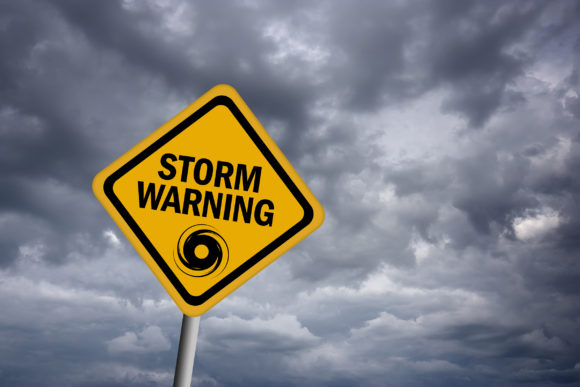Tropical Storm Dorian is about to sideswipe Puerto Rico and the U.S. Virgin Islands. And if you live on Florida’s east coast, it may be time to start gathering supplies.
Chances are increasing that the storm will approach Florida bringing 100-mile-per-hour winds, making it a Category 2 hurricane, according to the U.S. National Hurricane Center. But first, it’s going to dump torrential rains on Puerto Rico, following a shift of the storm’s center overnight. It will be the first major storm to hit Puerto Rico since Hurricane Maria devastated the island with 155 mph winds in 2017.
Dorian’s winds are now 60 mph, according to the center’s 8 a.m. update, so it’s not yet a hurricane. But it’s quickly getting more organized. President Donald Trump has approved a Puerto Rico emergency declaration and ordered federal assistance for the territory to support local response.
“The central coast of Florida and even up to the Carolinas should be watching out for this,” said Adam Douty, a meteorologist with AccuWeather Inc. in State College, Pennsylvania. There is “high confidence” it will be a strong Category 1 or even Category 2 hurricane when it strikes early next week, he said.
The government of Antigua issued a tropical storm warning for the British Virgin Islands, while another is also in effect for Isla Saona to Samana in the Dominican Republic. Dorian is lopsided, with most of its power on its eastern side, which will be pointed away from Puerto Rico as it passes later Wednesday into early Thursday, Douty said.
The storm shifted course overnight, and is now set to brush across Puerto Rico’s east coast rather than its center, according to the hurricane center. That means it’s heading northwest over open water instead of bumping into the mountains of Hispaniola that could have sapped it of power.
New Path
Dorian was about 60 miles (97 kilometers) southeast of St. Croix as of 8 a.m. New York time. The new path shows it menacing Orlando by early Monday.
The more immediate concern remains Puerto Rico, though Dorian is unlikely to deliver the destruction seen two years ago with Hurricane Maria.
“I don’t think Puerto Rico should freak out about this storm,” said Jeff Masters, co-founder of Weather Underground, an IBM business. “It’s going to be nothing like Maria.”
Maria was a Category 5 hurricane. While still a tropical storm, Dorian could spur significant flooding for an island where some homes and businesses still are covered with tarps following the devastation from Maria.
We are tracking closely tropical storm Dorian as it heads, as usual, to Puerto Rico. FEMA and all others are ready, and will do a great job. When they do, let them know it, and give them a big Thank You – Not like last time. That includes from the incompetent Mayor of San Juan!
— Donald J. Trump (@realDonaldTrump) August 28, 2019
Ports in St. Croix in the U.S. Virgin Islands and Puerto Rico are expected to to be shut on Wednesday as Dorian approaches, the U.S. Coast Guard said in a statement. A hurricane watch was issued for Vieques, Culebra and the Virgin Islands.
This week, San Juan residents of San Juan crowded into shopping centers to stock up on food and water, and Governor Wanda Vazquez declared a state of emergency.
Meanwhile, a second tropical storm has now formed about 265 miles southeast of Cape Hatteras, the hurricane center said. Tropical Storm Erin was upgraded overnight and is racing up the East Coast with winds of 40 mph.
Erin will transition into a post-tropical system when it slams the eastern end of Nova Scotia late Thursday or early Friday. A cold front moving across the eastern U.S. will tap into its moisture and bring heavy rain to eastern New England, including Boston, late Wednesday, Accuweather’s Douty said.
Flash flood watches have been posted across parts of Rhode Island, Massachusetts, New Hampshire and Maine, a coastline crowded with tourists for the upcoming Labor Day weekend holiday.
–With assistance from Michael Deibert, Sharon Cho and Bill Lehane.
Topics USA Catastrophe Natural Disasters Florida Windstorm Hurricane
Was this article valuable?
Here are more articles you may enjoy.



 Insurance Broker Stocks Sink as AI App Sparks Disruption Fears
Insurance Broker Stocks Sink as AI App Sparks Disruption Fears  Florida Insurance Costs 14.5% Lower Than Without Reforms, Report Finds
Florida Insurance Costs 14.5% Lower Than Without Reforms, Report Finds  AI Needs Its Own Risk Class: Lockton Re
AI Needs Its Own Risk Class: Lockton Re  How One Fla. Insurance Agent Allegedly Used Another’s License to Swipe Commissions
How One Fla. Insurance Agent Allegedly Used Another’s License to Swipe Commissions 

